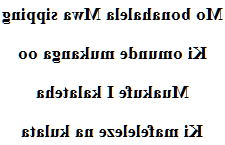SiLozi love poem
Mo bonahalela Mwa sipping
Ki omunde mukanga oo
Muakufe I kalateha
Ki mafeleleze na kulata


→ French poem ←
SiLozi language
Love poem translated into Silozi (Rozi, Lozi, Kololo, Rutse, Rotvi, Rotse, Tozvi) the Bantu language of the Lozis (Rotses, Malozi), disseminated in several countries of southern Africa. Not far shona and bemba, 800,000 Lozis from Botswana, Zimbabwe, Namibia and Zambia will be able to understand my little poem.
Lozi is a Sotho language, a mixture of other Bantu languages, including Sesotho, Setswana and Luyana.
This language appeared gradually from the 1920s when a group of southern Sothos (from what is now South Africa), Makololos, fleeing the war to go further north.
On their way to Barotseland (Buloziland), they mixed with groups speaking Setswana, then there with Luyanas. Their language initially (Kololo) in contact with Setswana and Siluyana, was gradually transformed and called silozi, then normalized to gradually become the main language of an entire region (lingua franca), which spans five countries. Many of those for whom Lozi is not their native language speak it as a second language.
Silozi is a written language that can be found in the media, in the administration and which is taught in schools. Its normalization with the creation of standards dates from the end of the 20th century. Indeed this standard is not necessarily the same in each country and it is in Zambia that we claim to be the owners of this language and that we consider to speak the real Silozi.
Silozi is a language in its own right, but mixed with other languages it is difficult to classify it.
The Lozis
The Lozis are farmers who grow sorghum, millet and maize, and also practice fishing and hunting. They were renowned for their state structure linked to a sophisticated administrative and military apparatus.
Their kingdom consisted of two capitals which at one time reached more than 10,000 inhabitants, and where reigned respectively a king and a princess. The sovereign was assisted by three councils composed of the royal family, and common people, entrusted with secular and religious functions.